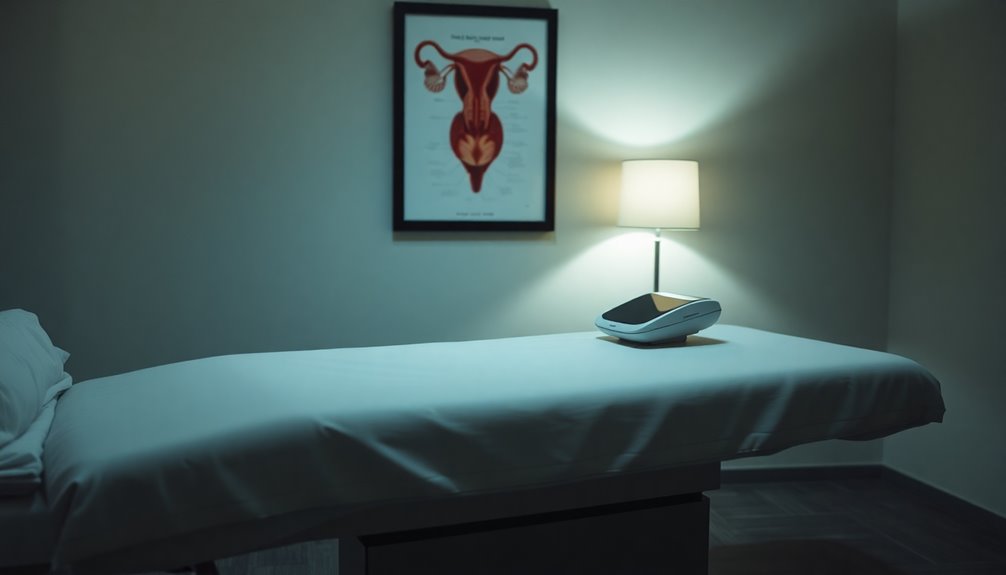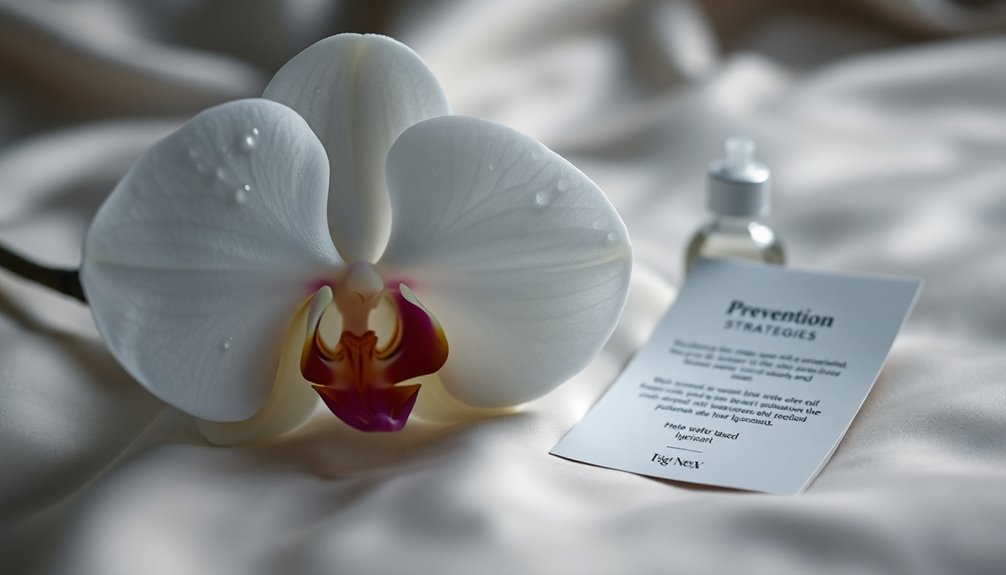Bleeding after sex can happen and isn't always a cause for concern. It's often linked to factors like vaginal dryness, infections, or even trauma from rough intercourse. In many cases, this bleeding is light spotting and resolves quickly. However, if you experience heavy or persistent bleeding, or if it's accompanied by severe pain, it's important to seek medical advice. Conditions like cervical polyps or infections may require treatment. Understanding your body's signals is key to maintaining your sexual health, and exploring the possible causes can give you more insight into this common issue.
Key Takeaways
- Bleeding after sex, often referred to as postcoital bleeding, affects about 9% of individuals with periods and can be linked to various causes.
- Common causes include vaginal dryness, infections, cervical polyps, and cervical ectropion, which may lead to minor bleeding after intercourse.
- Spotting or light bleeding can be normal, especially in cases of dryness or minor trauma, but persistent or heavy bleeding is a concern.
- Seek medical help if bleeding is heavy, accompanied by severe pain, occurs postmenopausally, or is frequent, as it could indicate serious conditions.
- Regular gynecological check-ups and awareness of body signals are essential for maintaining sexual health and addressing any abnormal symptoms promptly.
Common Causes of Bleeding

Bleeding after sex can be concerning, but it's often linked to common causes that are usually not serious. One main cause is vaginal dryness, which can lead to small tears during intercourse. If you're experiencing discomfort, this could result in bleeding.
Infections, such as cervicitis or STIs, can also trigger inflammation that causes bleeding during or after sex. Additionally, cervical polyps—noncancerous growths—might contribute to your bleeding, especially if they're irritated.
Postcoital bleeding can be linked to cervical ectropion, particularly in those using hormonal contraceptives. It's crucial to evaluate these factors before seeking medical care, but understanding these common causes can help alleviate concerns about bleeding after sex.
When to Seek Medical Help

Experiencing bleeding after sex can be alarming, especially when it happens frequently or is accompanied by other symptoms.
If you're dealing with vaginal bleeding after sex that's heavy or persistent, it's crucial to seek medical help. This could indicate an underlying cause, such as cervical cancer or sexually transmitted infections.
Be sure to contact your doctor if you notice severe pain, abnormal discharge, or itching, as these may suggest an infection.
If you're postmenopausal, any bleeding is a cause for concern and warrants immediate evaluation.
Frequent bleeding after sex should prompt a pelvic exam to rule out conditions like cervical polyps or anatomical abnormalities.
Don't hesitate to seek help if bleeding lasts longer than a few hours.
Bleeding During Pregnancy

Bleeding during pregnancy can happen for several reasons, often due to increased sensitivity in the cervix.
While minor bleeding after sex is usually not a cause for concern, it's important to talk to your healthcare provider about any bleeding you experience.
If you notice heavy or persistent bleeding, seek medical help right away to rule out serious complications.
Common Causes During Pregnancy
While it's not uncommon to notice some light bleeding after sex during pregnancy, it's important to understand the potential causes.
Minor bleeding may occur due to increased blood flow to the cervix, making it more sensitive. Hormonal changes can lead to cervical ectropion, where cervical cells extend outside the cervix, contributing to postcoital bleeding.
In most cases, bleeding after sex during pregnancy isn't a serious issue, but it's vital to discuss any incidents with your healthcare provider for reassurance and evaluation. Additionally, understanding the importance of clear communication during such sensitive times can help manage any anxiety about the situation.
However, if you experience heavy or persistent bleeding, seek medical attention immediately, as it could signal complications like a miscarriage or ectopic pregnancy.
Always prioritize your health and any unusual symptoms.
When to Seek Help
Postcoital bleeding during pregnancy can raise concerns, and knowing when to seek help is important for your peace of mind and safety. Minor bleeding after sex is often normal due to increased blood flow, but if you experience heavy or prolonged vaginal bleeding, it's essential to contact your healthcare provider. In late pregnancy, bleeding could indicate serious issues like placental abruption or preterm labor, requiring immediate medical attention. Always report any bleeding accompanied by severe pain, cramping, or unusual discharge. Regular prenatal check-ups are critical for monitoring bleeding concerns and ensuring overall health. Additionally, discussing late effects of breast cancer may be necessary if you have a history of breast health issues that could complicate your pregnancy.
| Symptom | Action Required | Reason for Concern |
|---|---|---|
| Light bleeding | Monitor, inform healthcare provider | Often normal |
| Heavy bleeding | Seek immediate medical attention | Potential complications |
| Severe pain | Contact healthcare provider immediately | Indicates possible issues |
| Unusual discharge | Report to healthcare provider | May signal infection or other issues |
| No prenatal check-ups | Schedule one ASAP | Essential for maternal and baby health |
Diagnosis and Evaluation

When you experience bleeding after sex, it's essential to undergo a detailed evaluation to determine the underlying cause.
Your diagnosis of postcoital bleeding typically starts with a thorough medical history and a physical examination of your reproductive organs. A pelvic exam helps identify any lesions, tears, or inflammation that may be causing the bleeding.
Additionally, laboratory investigations like Pap smears and STI screenings are often performed to rule out infections or abnormal cervical cells.
For a more extensive evaluation, advanced imaging techniques such as transvaginal ultrasounds may be used to examine the pelvic organs and surrounding tissues.
If these initial evaluations don't reveal a clear cause, further diagnostic procedures like colposcopy might be recommended to closely examine the cervix and vaginal tissues.
Treatment Options Available

Understanding the treatment options for bleeding after sex is essential for effective management and relief. Your journey usually begins with a thorough medical evaluation to identify underlying causes, such as infections or cervical polyps.
If infections like cervicitis are detected, antibiotics or antiviral medications can resolve the issue. For those experiencing dryness due to hormonal changes, vaginal lubricants or moisturizers may help reduce friction and alleviate bleeding.
In some cases, surgical options might be necessary to remove cervical polyps or address any cancerous lesions. Early intervention for serious conditions can greatly improve health outcomes, reducing the risk of recurrent postcoital bleeding and ensuring your overall well-being is prioritized.
Prevention Strategies

To prevent bleeding after sex, you should prioritize lubrication, as it can considerably reduce friction and discomfort.
Engaging in gentle sexual practices helps avoid injury, while regular medical check-ups keep you informed about your sexual health.
Lubrication Use Importance
Using lubrication during intercourse is essential not just for comfort, but also for preventing postcoital bleeding. Insufficient lubrication can lead to vaginal dryness, increasing friction and the risk of irritation and tissue damage. This is particularly true for those experiencing hormonal changes, which can make dryness more pronounced.
To minimize these risks, opt for water-based or silicone-based lubricants, as they effectively reduce friction and are safe to use with condoms. Incorporating vaginal moisturizers regularly can also help maintain moisture levels.
Additionally, increasing foreplay can enhance your body's natural lubrication, further decreasing the likelihood of postcoital bleeding due to trauma. Prioritize lubrication to guarantee a more comfortable and safe sexual experience.
Gentle Sexual Practices
When you prioritize gentle sexual practices, you can greatly enhance your comfort and reduce the risk of postcoital bleeding.
Using ample lubrication is key; it minimizes friction and lowers the chance of tissue damage during intercourse.
Consider incorporating longer foreplay to boost arousal and natural lubrication, which helps combat vaginal dryness.
Opt for slower, more controlled movements to avoid trauma, especially if you experience discomfort.
Water-based or silicone-based lubricants can further alleviate friction and prevent irritation of the vaginal lining.
Finally, don't underestimate the power of communication; openly discussing comfort levels with your partner can create a safer environment and considerably lower the risk of injury that may lead to bleeding.
Regular Medical Check-ups
Maintaining your comfort during intimate moments is essential, but regular medical check-ups play an equally important role in your overall reproductive health. Scheduling annual gynecological check-ups allows you to monitor reproductive health and address concerns like bleeding after sex. These visits often include crucial screening tests, such as Pap smears and STI screenings, which can detect underlying causes of abnormal bleeding.
| Check-Up Type | Importance | Frequency |
|---|---|---|
| Gynecological Exam | Early detection of issues | Annually |
| Pap Smear | Cervical health screening | Every 3 years |
| STI Screening | Detects sexually transmitted infections | Annually or as needed |
| Personal Health Review | Tailors medical advice | At each visit |
| Open Communication | Addresses concerns and symptoms | Ongoing during visits |
Understanding Your Body

How well do you understand your body and its responses?
Postcoital bleeding affects about 9% of individuals with periods, often appearing as spotting or minor bleeding after sex. Common causes include vaginal dryness, which can be heightened by hormonal changes during menopause or breastfeeding, and infections.
Cervical polyps, cervicitis, or trauma from rough intercourse can also lead to bleeding. While occasional bleeding may not be serious, persistent or heavy bleeding should prompt a medical consultation for evaluation.
Understanding these factors can help you identify what's normal for your body and recognize when it's time to seek help. Being aware of your body's signals and responses is essential for maintaining your sexual health.
Frequently Asked Questions
Do I Need to Worry if I Bleed After Sex?
If you bleed after sex, it's understandable to feel concerned.
While occasional minor bleeding mightn't be serious, you shouldn't ignore persistent or heavy bleeding. It could signal issues like cervical inflammation or infections that need attention.
It's best to consult a healthcare provider to rule out any underlying conditions.
Staying proactive with regular gynecological check-ups can help you monitor your reproductive health and ease any worries you might have.
What Causes Bleeding After Sex?
Bleeding after sex can stem from a variety of surprising sources.
You might experience vaginal dryness, leading to friction and tiny tears. Infections like cervicitis or vaginitis could trigger irritation, while benign growths such as cervical polyps might contribute to bleeding.
Additionally, if you've had rough intercourse without enough lubrication, you could injure the vaginal lining.
If bleeding persists, it's best to consult a healthcare professional for clarity and peace of mind.
Is It Normal to Wipe a Little Blood After Sex?
Wiping a little blood after sex can be concerning, but it's not always a sign of something serious.
You might experience minor bleeding due to vaginal dryness, cervical irritation, or small tears, especially if you're not using enough lubrication.
While occasional spotting can be normal, you should keep an eye on how often it happens.
If the bleeding becomes frequent or heavy, it's important to consult with your healthcare provider for peace of mind.
Can Deep Sex Cause Bleeding?
Yes, deep sex can cause bleeding.
When penetration is deep, it may create friction against the vaginal walls, potentially leading to small tears.
If you're not using enough lubrication, dryness can increase the risk of irritation and bleeding.
Engaging in rough practices without sufficient foreplay also raises the chances of injury.
If you notice consistent bleeding after deep sex, it's wise to consult a healthcare provider to rule out any underlying issues.
Conclusion
In summary, if you experience unexpected bleeding after sex, don't dismiss it as normal. Understanding your body is essential for your health. Seek timely attention to uncover any underlying issues. Remember, being proactive can prevent potential problems and promote peace of mind. So, whether it's spotting or something more serious, stay savvy and seek support. Your well-being matters, and it's vital to prioritize your health in any situation. Stay informed, stay safe, and keep caring for yourself!










